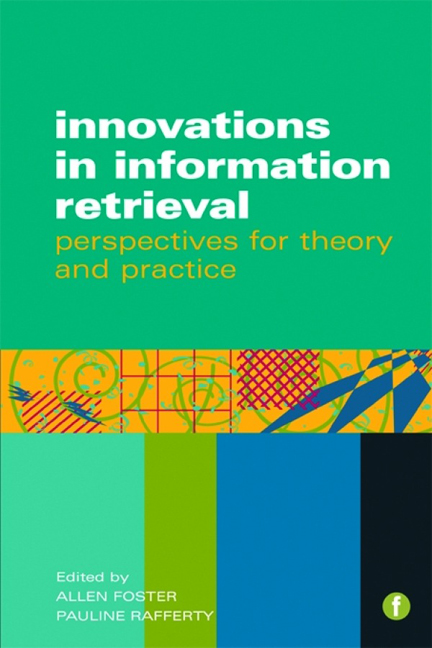Book contents
- Frontmatter
- Contents
- Figures and tables
- Contributors
- Foreword
- Introduction
- 1 Encountering on the road to Serendip? Browsing in new information environments
- 2 Classification revisited: a web of knowledge
- 3 Approaches to fiction retrieval research: from theory to practice?
- 4 Music information retrieval research
- 5 Folksonomies, social tagging and information retrieval
- 6 Digital information interaction as semantic navigation
- 7 Assessing web search engines: a webometric approach
- Index
Introduction
Published online by Cambridge University Press: 08 June 2018
- Frontmatter
- Contents
- Figures and tables
- Contributors
- Foreword
- Introduction
- 1 Encountering on the road to Serendip? Browsing in new information environments
- 2 Classification revisited: a web of knowledge
- 3 Approaches to fiction retrieval research: from theory to practice?
- 4 Music information retrieval research
- 5 Folksonomies, social tagging and information retrieval
- 6 Digital information interaction as semantic navigation
- 7 Assessing web search engines: a webometric approach
- Index
Summary
This is a book about research fronts in information retrieval and information organizations. As teachers of information retrieval and researchers in the field, we felt that a book specifically intended to inform and inspire Master's-level students who might be looking to develop their dissertation topics, or indeed to develop PhD proposals, would be useful and interesting We thought that this should be an edited and peer-reviewed book in which academics in information retrieval would be invited to write about the issues and topics that they think are of current interest and that they find engaging. This book, then, is intended to complement the information retrieval textbooks that are already in the market. The focus of this book is to introduce students to the broader information retrieval debates, theories and issues. To this end, contributors have been encouraged to highlight the ‘hot’ research ideas in their specialist area.
For many years the theory and practice of knowledge organization remained the preserve of information scientists and library professionals. The ubiquity and accessibility of the internet has changed this: no longer the sole concern of the library and information science (LIS) community, knowledge organization has caught the interest of computer scientists, semantic web developers and know - ledge managers working in a wide range of organizations involved in the creation, storage, retrieval and dissemination of information, in particular, digital information. While traditional subject-oriented knowledge organization tools have been created and developed from within scholarly domains, so that the underlying concern has been to map ‘knowledge’ for academic purposes (e.g. DDC, LC, A&AT, Iconclass), contemporary subject-oriented knowledge organiz - ation tools are often driven by commercial, process and product-driven purposes.
The advent of new information retrieval technologies and approaches to storage and retrieval provides communities with previously unheard-of opportunities for mass documentation, digitization and the recording of cultural artefacts. A number of the contributors to this book focus in a variety of ways on issues relating to mass information retrieval in a digital age. In generating information retrieval for the public to contribute, describe and share, particular issues arise as to how shared meanings, quality of interpretation, indexing and tagging are accomplished. Related topics, such as generic categorization, semantic interoperability, dialogic semiotic interaction, once perhaps considered the preserve of other disciplines (linguistics, psychology, computer science), are increasingly of interest to the retrieval theorist and practitioner.
- Type
- Chapter
- Information
- Innovations in Information RetrievalPerspectives for theory and practice, pp. xv - xviiiPublisher: FacetPrint publication year: 2011



